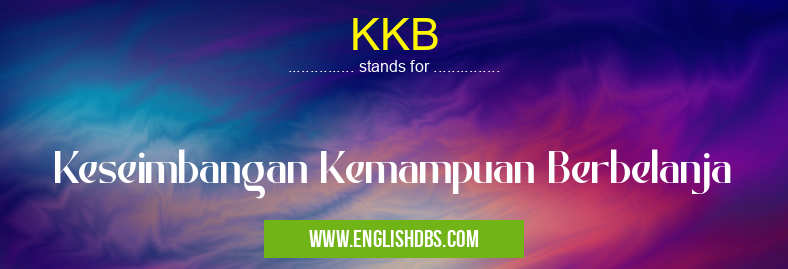What does KKB mean in UNCLASSIFIED
KKB stands for Keseimbangan Kemampuan Berbelanja in Indonesian, which translates to Balance of Purchasing Power. It is a measure of the purchasing power of a population, calculated by dividing the total income of a population by the cost of living.

KKB meaning in Unclassified in Miscellaneous
KKB mostly used in an acronym Unclassified in Category Miscellaneous that means Keseimbangan Kemampuan Berbelanja
Shorthand: KKB,
Full Form: Keseimbangan Kemampuan Berbelanja
For more information of "Keseimbangan Kemampuan Berbelanja", see the section below.
Explanation
The KKB is a useful metric for understanding the economic well-being of a population. A high KKB indicates that the population has a high level of purchasing power, which means that they have more money available to spend on goods and services. A low KKB, on the other hand, indicates that the population has a low level of purchasing power, which means that they have less money available to spend.
The KKB can be used to compare the purchasing power of different populations, or to track changes in the purchasing power of a single population over time. It can also be used to identify areas where people are struggling to make ends meet, and to develop policies to address these issues.
Factors that Affect KKB
Several factors can affect the KKB of a population, including:
- Income: The total amount of money earned by a population
- Cost of living: The cost of goods and services in a particular area
- Inflation: The rate at which prices are rising
- Demographics: The age, gender, and other characteristics of a population
- Government policies: Taxes, subsidies, and other government policies can all affect the KKB
Essential Questions and Answers on Keseimbangan Kemampuan Berbelanja in "MISCELLANEOUS»UNFILED"
What is KKB (Keseimbangan Kemampuan Berbelanja)?
KKB stands for Keseimbangan Kemampuan Berbelanja, which translates to "Shopping Ability Balance." It is a financial metric used in Indonesia to assess an individual's ability to make purchases based on their income and expenses.
How is KKB calculated?
KKB is typically calculated by dividing an individual's monthly income by their monthly expenses. The resulting ratio indicates the proportion of their income that is available for shopping or discretionary spending.
What is considered a good KKB?
A good KKB varies depending on individual circumstances. However, a KKB of 50% or higher is generally considered healthy, indicating that an individual has a significant amount of their income available for shopping.
What factors affect KKB?
Factors that can affect KKB include income level, expenses (both fixed and variable), savings goals, and debt obligations.
Why is KKB important?
KKB can help individuals make informed financial decisions and avoid overspending. It can also serve as an indicator of financial health and well-being.
How can I improve my KKB?
To improve your KKB, you can consider increasing your income, reducing your expenses, or a combination of both. It is also important to manage debt effectively and prioritize saving for future financial goals.
Final Words: The KKB is a useful metric for understanding the economic well-being of a population. By measuring the purchasing power of a population, the KKB can help policymakers to identify areas where people are struggling to make ends meet and develop policies to address these issues.
